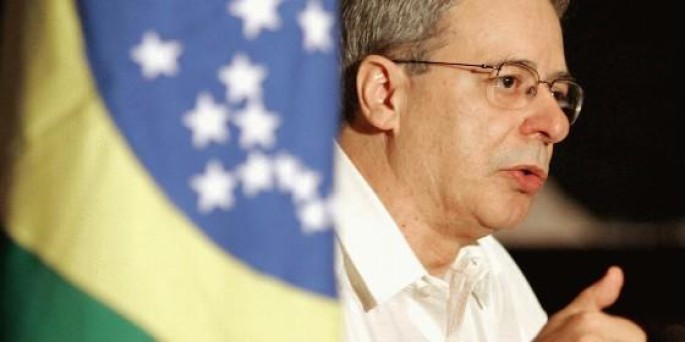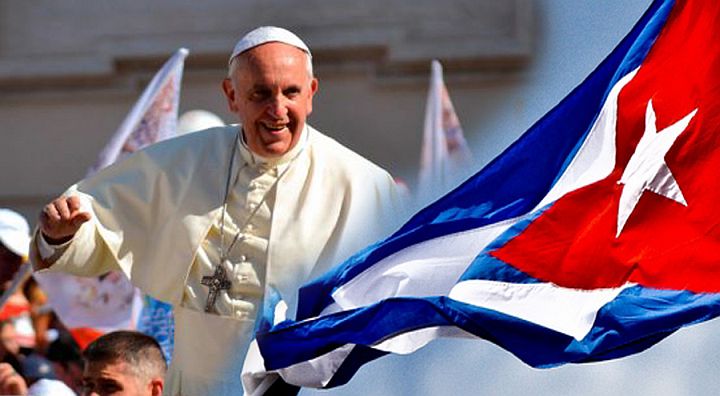
Frei Betto speaks of the Pope’s visit to Cuba
THE RIGHT’S PRAYER FOR POPE FRANCIS: ‘LORD, ENLIGHTEN HIM OR ELIMINATE HIM…’
Just finished reading an enlightening interview with Frei Betto in the magazine Religion Digital (Digital Religion) that we’ve re-printed (in Spanish) in Progreso Semanal. The subject of the interview is Pope Francis’ visit next month to Cuba. Those who know of Betto understand he has had close ties to Cuba for many years; he is also a good friend of Fidel Castro, and published a 1985 interview with the Cuban leader that later became the book, Fidel and Religion.
Betto is a Brazilian Dominican friar, theologian, poet, journalist, educator, and novelist. He is very knowledgeable of the Cuban Revolution. In the 1980s he advised socialist governments including Cuba, the former Czechoslovakia, China, the former Soviet Union, Nicaragua and Poland about relations between the Catholic Church and the State. In Brazil, he survived two illegal arrests and was tortured during the military dictatorships.
Betto was part of the first government of Lula da Silva and served as adviser to the president. He was also an executive and advisor to the “Fome Zero” (Zero Hunger) campaign, the main social program in the first stage of Lula’s presidency. He later resigned for differences with members of the executive.
We have not translated the full Betto interview to English. But there are some answers that are too good not to share with our English readers.
I’ve started at the end where Raúl Juárez, the interviewer, concludes the question and answer session by asking the Brazilian:
Finally, we have discovered the importance of symbolism in our lives. What symbol or image would Frei Betto use to describe this historic visit of Pope Francisco to Cuba and the United States?
Betto: I would say this trip is the equivalent, while in Cuba, of Jesus’ encounter with the crowd and the sharing and distribution of the loaves and fishes; and in his time in the U.S., when Jesus entered the temple and drove out all who sold and bought in the temple, overturning the tables of the money-changers…
Ouch!
And speaking of the money-changers, here’s another zinger:
Pope Francis is not expected to receive a very good reception from certain conservative sectors in the United States, especially for his criticism of the economic-cultural-social model of neoliberalism made in LAUDATO si’ (Praise be to you) and in speeches and homilies made in his last apostolic trip to the poorest countries in South America. What might be the main attacks [against him]? What could the most conservative sectors accuse Pope Francis of?
Betto: Both the right in the U.S. as well as the fundamentalist Christians pray in this way for Francis: “Lord, enlighten him or eliminate him…” Francis is not naive and knows he will be criticized by the money owners who have caused global genocide. Like Jesus, Francis fears nothing. He does not even care about his personal safety, as I witnessed on his trip to Brazil in 2013 for World Youth Day in Rio, and when I visited him in Rome in April 2014.
Among the Cuban dissidents there are some who reject the actions of Pope Francis, especially in regard to the influence he had on the reopening of normal relations between the U.S. and Cuba. How does this criticism influence public opinion of the residents on the island?
Betto: There is little chance that these dissidents find an echo within the island. The Cuban population is mostly very religious, although much of it is not officially Catholic. What predominates among them is syncretism, that is, a Christian tradition with religions of African origin brought by former slaves.
For the anti-Castro Cubans and the American fundamentalist right, the resumption of U.S.-Cuba relations and an end to the blockade constitute a severe blow. They automatically become criminals if they officially oppose these relationships. And now American tourists [will] know with their own eyes the Cuban reality and can perceive the lies spread by the media at the service of capitalist interests with respect to the island, where there are no street children or homeless families living under bridges.
[Click here to read the complete interview in Spanish.]


